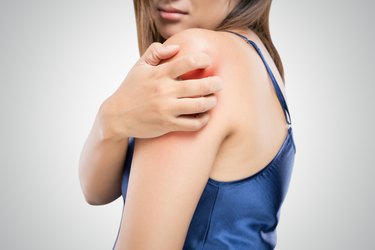
You've worked hard and lost weight, but now your skin really itches, and it's quite annoying. Might there be a connection between weight loss and itchy skin? Yes, there very well could be, says Tanya Nino, MD, a dermatologist with St. Joseph Hospital in Orange County, California.
What's the Connection?
Video of the Day
Now that you're thinner, there are a number of possible explanations for your itchy skin, Dr. Nino says.
Video of the Day
For instance, if you ate a low-fat diet to lose weight, the lack of fat can contribute to dry skin, which can itch, she says. Also, while eating to lose weight, you may have skipped over some important nutrients that your skin needs to stay healthy, she adds.
Did you exercise a lot to lose weight? Some exercises, such as bicycling or running, can cause your skin to rub against itself or clothing or other objects. "Depending on how much and what exercise you are doing to lose weight, itching also can be related to frictional irritation," Dr. Nino says. The medical term for a red, itchy skin rash caused by skin-to-skin friction is intertrigo, the Mayo Clinic says.
Finally, Dr. Nino says, exercising and sweating a lot in your efforts to lose weight can cause fungal or bacterial infections that can cause your skin to itch. If this happens, you may need to see a doctor who can prescribe medication to heal your skin, the Mayo Clinic says.
Eating for Healthy Skin
When you're trying to lose weight, you want to limit the fat in your diet because fat has twice as many calories per gram as carbohydrates and protein, the Cleveland Clinic says. However, you don't want to eliminate fat from your diet entirely, according to the National Institutes of Health. A good guide would be to limit your intake of saturated fat to about 10 percent of calories a day, the Mayo Clinic says.
The best fats are unsaturated fats, which are typically liquid at room temperature. Examples are canola oil, sunflower oil, peanut oil and olive oil.
You also want to include some omega-3 fatty acids in your diet. Omega-3s are found in fatty fish such as salmon, mackerel, trout, herring and tuna. Plant sources include ground flaxseed, oils such as canola, flaxseed, soybean, and nuts and other seeds, including walnuts, butternuts and chia seeds.
People are often aware that omega-3 fatty acids are essential to heart health, as the Mayo Clinic notes. But did you know that fish oil also may have beneficial effects on your skin? A study published in August 2018 in Marine Drugs found that fish oil can help your skin stay healthy, too.
Also be sure that your weight-loss diet doesn't skimp on riboflavin or niacin, either, the University of Michigan Medicine says. Both are needed for skin health. Sources of riboflavin include milk, leafy green vegetables, whole grains and enriched bread and cereal. Niacin (vitamin B3) sources include meat, fish, poultry, whole-grain or enriched cereal and bread, mushrooms, asparagus, green leafy vegetables and peanut butter.
Read more: 10 Recipes for Glowing, Healthy Skin
How to Stop the Itch
The American Academy of Dermatology (AAD) offers these tips to keep your dry skin on the new you from itching:
- Get in and out of water. Keep your baths
and showers brief and use water that's warm, not hot. Use mild cleansers and
dry off with gentle pats.
- Moisturize. Apply moisturizer to your skin
soon after your bath or shower to trap in the moisture. Ointments and creams
are more effective than lotions. Use hand cream after washing your hands, too.
- Humidify the air. Humidifiers add
moisture to the air, which helps your skin.
Also, drink lots of water. Not only does water help your skin stay healthy, it can also contribute to weight loss, the Mayo Clinic says.
Finally, if your itchy skin is from something other than weight loss and dry skin, be sure to talk to your doctor. You need a diagnosis to determine the best way to proceed, the AAD says.
- Tanya Nino, MD, dermatologist, St. Joseph Hospital, Orange County, California
- Mayo Clinic: “Common Skin Rashes”
- American Academy of Dermatology: “Dry Skin Relief”
- National Institutes of Health: “The Skinny on Fat”
- Cleveland Clinic: “Fat: What You Need to Know”
- Mayo Clinic: “Nutrition and Healthy Eating”
- Marine Drugs: “Cosmetic and Therapeutic Applications of Fish Oil’s Fatty Acids on the Skin”
- University of Michigan Medicine: “Vitamins Their Functions and Sources”
- Mayo Clinic: “Are You Struggling to Drink Enough Water Daily?”
- American Academy of Dermatology: “10 Reasons Your Skin Itches Uncontrollably and How to Get Relief”
Is this an emergency? If you are experiencing serious medical symptoms, please see the National Library of Medicine’s list of signs you need emergency medical attention or call 911.